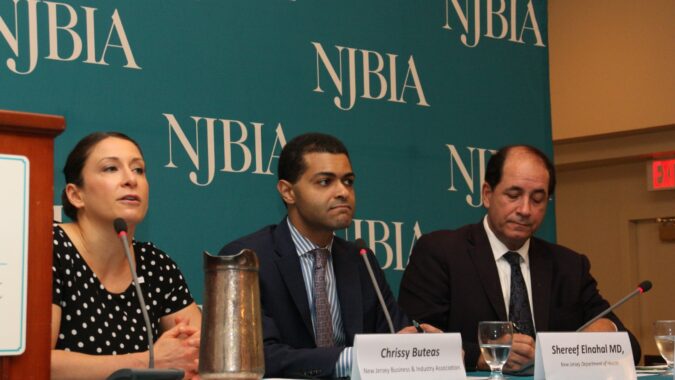
NJBIA’s Chrissy Buteas introduces Health Commissioner Dr. Shereef Elnahal (center) and Senator Joe Vitale at the Nov. 7 Healthcare Town Hall
A couple of important votes in the mid-term election haven’t received a lot of attention on the East Coast, but they may point the way to where New Jersey is headed in the near future.
On Nov. 6, voters in three states approved marijuana legalization: Utah and Missouri voters approved legalization of medical marijuana, while Michigan became the first Midwestern state to legalize the recreational variety.
New Jersey is considering both issues right now, and what it decides could have an impact on workplaces throughout the state.
Though medical marijuana has been legal in New Jersey for some time, the Christie administration kept tight controls on distribution. The Murphy administration’s goal is not only to increase access to medical marijuana but to legalize recreational use as well.
At NJBIA’s Healthcare Town Hall on Nov. 7, Health Commissioner Dr. Shereef Elnahal said the administration had done about everything it could do administratively to make medical marijuana more available, and has doubled the number of people in the program.
But increasing access beyond this would require legislative action. State Senator Joe Vitale, also speaking at the Town Hall event, is sponsoring legislation that would make medical marijuana more accessible and give legal protections to caregivers who provide it.
Elnahal said medical marijuana would be another tool at physician’s disposal that can do more than aspirin to relieve a patient’s symptoms, but with less risk than opioids.
“The grand total of deaths from marijuana overdose in human history is zero. Compare that to what you see with opioids,” Elnahal said. “We know that the risks, in terms of the risk-benefit profile of marijuana versus other medications that we routinely prescribe for similar conditions, are much lower.”
But legalization comes with its own set of problems, not the least of which are its potential impacts on a drug-free workplace. NJBIA is working with lawmakers to ensure any legalization bill gives employers the tools to keep people from working at their businesses while high.
NJBIA Vice President Mike Wallace said legalization bill should include provisions that will allow employers to maintain a drug-free workplace, including the right to terminate employees who test positive for the drug.
“NJBIA is not asking for anything extraordinary; employers continue to have this right in states like Colorado, California, and Massachusetts that have legalized marijuana,” Wallace explains.
Vitale said legalizing recreational marijuana use could also hurt the medical marijuana industry.
“In other states we’ve seen the medical programs really take a hit, because folks are just going to the dispensary,” Vitale said. “They go there to buy their cannabis in whatever form, and not going to the medical facility, not maintaining a relationship with their doctor, and maybe not seeing a doctor in the first place.”

